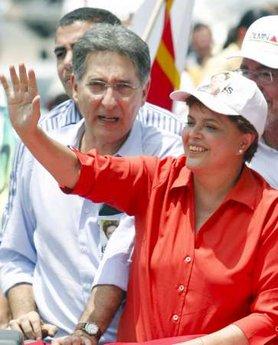Rousseff seen winning as Brazil elects new leader
Published: 08/02/2012 09:54
President Luiz Inacio Lula da Silva's chosen candidate, Dilma Rousseff, looked certain to succeed him as president of Brazil after a runoff vote Sunday.
Brazil's presidential candidate for the ruling Workers' Party Dilma Rousseff waves to supporters during a campaign rally in Belo Horizonte October 30, 2010. Polling stations opened at 8:00 am (1000 GMT), with Brazil's 135 million voters called out to make a choice between Rousseff, Lula's 62-year-old former cabinet chief, and her opposition rival, former Sao Paulo state governor Jose Serra, 68. Voting is compulsory in Brazil. Surveys published Sunday, the day of the runoff, suggested Rousseff had a lead of 10 to 12 points -- too big an advantage for Serra to hope for an upset. A Datafolha institute poll printed in the Folha de Sao Paulo daily suggested Rousseff would win the election with 55 percent of valid ballots, to 45 percent for Serra. A survey by the Ibope institute in the competing Estado de Sao Paulo newspaper predicted 56 percent for Rousseff and 44 percent for Serra. Lula has to hand over power on January 1, 2011 after completing the maximum two consecutive terms permitted under Brazil's constitution. He is leaving with a record 80-percent plus popularity rating -- something he cannily leveraged to give Rousseff a boost during her campaigning. Rousseff, a career bureaucrat who was once jailed and tortured in the 1970s under Brazil's then-military dictatorship for belonging to a guerrilla group, has vowed to maintain Lula's policies. Whoever wins Sunday's runoff will take charge of Latin America's biggest nation, the eighth-biggest economy in the world which is currently experiencing prosperity and a raised profile on the world stage. "Everything indicates that candidate Rousseff will be elected president," said Guilherme Carvalhido, a political science professor at Veiga de Almeida University in Rio de Janeiro. "The numbers by the polling institutes converge and there is also a consolidation of votes, and this has reduced the number of undecideds," he said. Carvalhido said "the only possibly surprising factor in this election could be the number of abstentions." "The proportion was 18 percent in the first round and there is a risk it could be 25 percent of more in the second round," he said. A public holiday next Tuesday meant many Brazilians were heading out of their home towns for an extended weekend, compounding the likelihood of a high abstention rate, despite the legal obligation to vote. Rousseff and Serra wrapped up campaigning Saturday in Belo Horizonte, the main city in the southern state of Minas Gerais and the second biggest electoral college in the country. Rousseff, who grew up in the city, told supporters: "I am going to work for a united Brazil, I am going to work for all Brazilians without exception." Serra, in a separate part of Belo Horizonte, told a crowd he was going to build upon the policies of Fernando Henrique Cardoso, Lula's predecessor who introduced the fiscal policies underpinning Brazil's financial stability. "We will not do the work of a man, a party or a single government," he said. Both Serra and Rousseff are technocrats respected for their management skills, but they lack the commanding charisma of Lula. Serra won recognition for a stint as health minister in the late 1990s during which he championed generic copies of HIV drugs for seropositive patients. Rousseff, largely unknown just months ago, served first as Lula's energy minister before being named as cabinet chief, analagous to prime minister. Ahead of her campaign, she softened her dour, lumbering image by a undergoing a cosmetic makeover. She also won some public sympathy for beating lymphatic cancer. In the first round, on October 3, she fell just short of the majority of ballots needed to avert the runoff, scoring 47 percent to Serra's 33 percent. She told supporters she was "confident" of winning the runoff. |
Provide by Vietnam Travel
Rousseff seen winning as Brazil elects new leader - Politics - News | vietnam travel company
You can see more
- Ambassador talks prospects of Vietnam-Singapore ties
- China was urged to respect Vietnam’s sovereignty and international law
- Cambodia party delegation welcomed in Hanoi
- Vietnam, Singapore relations thrive
- NA Standing Committee wraps up 16th session
- Deputy PM lauds ties with Yunnan
- Vietnam, Russia further develop defence ties
- National Assembly concludes annual session on a positive growth message
enews & updates
Sign up to receive breaking news as well as receive other site updates!
- Banh Đa Cua - a traditional Hai Phong specialty
- Exploring Lai Chau cuisine
- Hanoi ranked top 3 cuisine in the world in 2023
- Beautiful resorts for a weekend escape close to Hanoi
- Travel trends in 2023
- In the spring, Moc Chau is covered in plum blossoms.
- The Most Wonderful Destinations In Sapa
- Top 3 Special festivals in Vietnam during Tet holiday - 2023
- 5 tourist hotspots expected to see a spike in visitors during Lunar New Year 2023
- How To Make Kitchen Cleaned
-
vietnam travel
http://www.vietnamtourism.org.vn " Vietnam Tourism: Vietnam Travel Guide, Culture, Travel, Entertainment, Guide, News, and...
-
Vietnam culture, culture travel
http://travel.org.vn " Vietnam culture
-
Vietnam travel, vietnam travel news, vietnam in photos
http://www.nccorp.vn " Vietnam travel, vietnam travel news, vietnam in photos
-
Vietnam tourism
http://www.vietnamtourism.org.vn " The official online information on culture, travel, entertainment, and including facts, maps,...
-
Vietnam Travel and Tourism
http://www.vietnamtourism.org.vn/ " Vietnam Travel, Entertainment, People, Agents, Company, Vietnam Tourism information.
-
Information travel online
http://www.travellive.org "Information travel online













